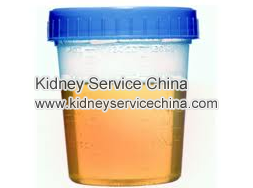Will Foamy Urine Caused By Proteinuria Disappear Quickly
 Will foamy urine disappear quickly? Patients who have this condition may have this curiosity. It is better for patients to have a better understanding about this aspect.
Will foamy urine disappear quickly? Patients who have this condition may have this curiosity. It is better for patients to have a better understanding about this aspect.
Foamy urine often appears in patients who have severe kidney disease. Patients may find they have small foams in their urine, and these foams can exist for a long time. For patients whose foamy urine is caused proteinuria, it will aggravate patients’ condition gradually if it has not been well controlled, which also means foamy urine will not disappear naturally, needless to say quickly.
Why do patients have foamy urine caused by proteinuria?
In normal condition, a few of proteins can be found in our urine. While proteinuria means the protein quantity in patients’ urine is more than the normal range.
Protein is an important substance to our body, and most protein will be kept in our blood. While for patients who have kidney disease, their kidney tubule and glomerulus will also be damaged. Glomerulus has filtration membrane, which can keep the useful substances in the blood, and kidney tubule has the function of reabsorbing the needed substances which have leaked out from glomerulus. So our internal circumstance can be kept in a stable range.
For patients with kidney disease, their disease can damage the kidney structure. While the damage may cause the permeability of membrane to increase or the decline of kidney tubule’s reabsorption ability. And much protein will also leak out in this process, and then patients will have proteinuria. If there are large amount of protein losing, patients will have foamy urine.
What can patients do to control this condition?
The reason of foams in urine is patients’ kidney damage, and it will not disappear automatically. On the contrary, it will aggravate patients’ kidney damage gradually if it has not been well controlled.
As a result, to improve this condition, patients should do their best to improve their kidney condition. In fact, patients can take measures in three major aspects, their treatment, diet, life habits.
Patients should restrict their protein intake in their diet, which can reduce the damage to patients’ kidneys. Besides, there are many aspects that should be paid attention to in their diet, like the sodium amount, the calcium amount, calory, etc, while these aspects should be regulated according to patients’ condition, and patients should ask for their doctor and dietitian’s help in making their eating plan.
Western medicine is good at controlling patients’ condition, like antibiotic, hormone, etc, but it can do few things in improving patients’ health condition. While traditional chinese medicine is good at treating disease systematically, and it can improve patients’ self- repairing ability, so it may be a good choice in improving patients’ kidney function.
While patients should also take positive measures in their life, which can be a great help in improving their health condition. For example, they should have regular and enough rest and avoid tired, and they should have appropriate and regular exercise, which can be a great help for patients’ condition improvement. Besides, it is important for patients to keep good emotion and have confidence in their life.
On the other hand, different patients have different condition, so patients should take measure according to their own condition. As a result, patients need to consult their doctor’s advice in any aspect’s change. Besides, if you need any help, you can also consult our online experts,and we are glad to help you.
Tag: Protein in Urine
previous:Symptoms Of Protein In Urine

